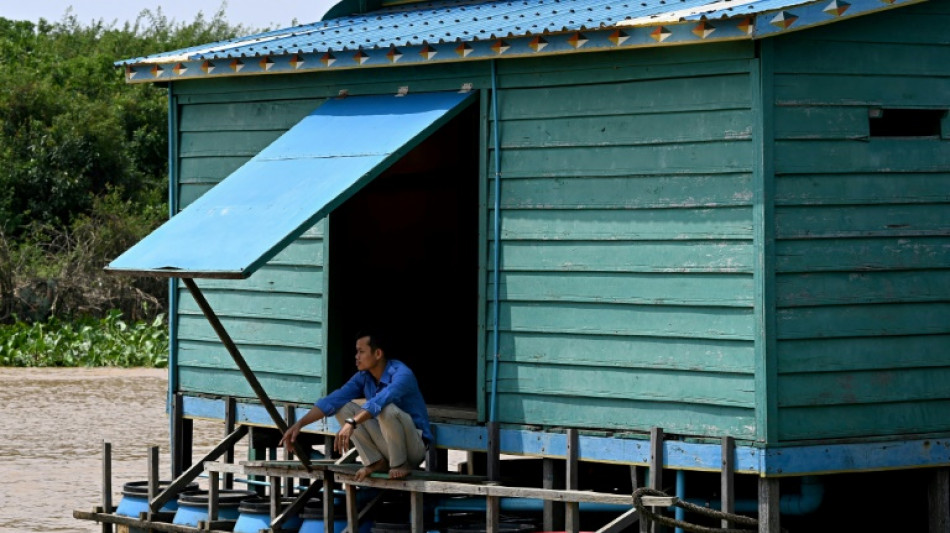
-
 Maduro arrives for first US court appearance after capture
Maduro arrives for first US court appearance after capture
-
How Ruben Amorim's Man Utd reign turned sour

-
 Xi urges South Korea's Lee to make 'right choices' in turbulent world
Xi urges South Korea's Lee to make 'right choices' in turbulent world
-
Medvedev renews call for early nights at Australian Open

-
 EU says 'seriously looking' into Musk's Grok AI over sexual deepfakes of minors
EU says 'seriously looking' into Musk's Grok AI over sexual deepfakes of minors
-
German renewable energy shift slowed in 2025

-
 Medvedev in great touch as he starts 2026 with Brisbane cruise
Medvedev in great touch as he starts 2026 with Brisbane cruise
-
French court jails one in Brigitte Macron cyber-bullying trial

-
 Oil prices ease as investors track Venezuela fallout
Oil prices ease as investors track Venezuela fallout
-
Patient killed in Russian strike on Kyiv clinic

-
 Myanmar pro-military party wins first phase of junta-run election: official results
Myanmar pro-military party wins first phase of junta-run election: official results
-
Double Olympic champion Chebet takes maternity break in 2026

-
 Amorim sacked by Man Utd after 14-month reign
Amorim sacked by Man Utd after 14-month reign
-
Maduro due for first US court hearing after capture

-
 Manchester United sack manager Ruben Amorim
Manchester United sack manager Ruben Amorim
-
Bangladesh says at least 287 killed during Hasina-era abductions

-
 South Korea's Lee meets Xi with trade, Pyongyang on the agenda
South Korea's Lee meets Xi with trade, Pyongyang on the agenda
-
Gauff shocked in United Cup, comeback kid Hurkacz stuns Zverev

-
 Tech firms lead markets higher, oil swings after Maduro ouster
Tech firms lead markets higher, oil swings after Maduro ouster
-
Defending Brisbane champion Lehecka wins tough opener

-
 Maduro's fall tests Venezuela's ruling 'club'
Maduro's fall tests Venezuela's ruling 'club'
-
'I can't walk anymore': Afghans freeze to death on route to Iran

-
 UK starts ban on junk food ads on daytime TV and online
UK starts ban on junk food ads on daytime TV and online
-
Trump declares US 'in charge' of Venezuela and Maduro goes to court

-
 Two killed in series of Russian attacks on Ukraine
Two killed in series of Russian attacks on Ukraine
-
Kasatkina feels pressure to 'repay Australia' after Russia switch

-
 Suns stun NBA-best Thunder as East-leading Pistons top Cavs
Suns stun NBA-best Thunder as East-leading Pistons top Cavs
-
China's birth-rate push sputters as couples stay child-free

-
 'Not about condoms': Chinese shrug off contraceptive tax
'Not about condoms': Chinese shrug off contraceptive tax
-
Root's majestic 160 powers England to 384 in final Ashes Test

-
 Chalamet boosts Oscar bid with Critics Choice Awards win
Chalamet boosts Oscar bid with Critics Choice Awards win
-
'Tuna King' pays record $3.2 mn for bluefin at Tokyo auction

-
 Tech firms lead Asian markets higher, oil swings after Maduro ouster
Tech firms lead Asian markets higher, oil swings after Maduro ouster
-
Cricket Australia boss hits out at 'archaic' bad light rules

-
 Trump insists 'we need Greenland'
Trump insists 'we need Greenland'
-
Century-maker Root steers England to 336-6 in final Ashes Test

-
 'Free our president', Maduro supporters demand at rally
'Free our president', Maduro supporters demand at rally
-
Danish PM calls on US to stop 'threatening' Greenland

-
 North Korea tests hypersonic missiles, says nuclear forces ready for war
North Korea tests hypersonic missiles, says nuclear forces ready for war
-
Root in Ponting territory with 41st Test century at 5th Ashes Test

-
 Unusual Machines Appoints Stacy Wright as Chief Revenue Officer
Unusual Machines Appoints Stacy Wright as Chief Revenue Officer
-
Ondas to Host OAS Investor Day on January 16, 2026, Highlighting Updated Business Plan, Core+ Strategic Growth Program, and 2026 Financial Outlook

-
 Infillion Relaunches Industry's First Agent-Native Composable Platform to End Advertising's False Choice
Infillion Relaunches Industry's First Agent-Native Composable Platform to End Advertising's False Choice
-
Stagwell (STGW) Launches 'The Machine': Marketing's First Agentic Operating System

-
 Loop Industries Appoints Spencer Hart as Chief Financial Officer
Loop Industries Appoints Spencer Hart as Chief Financial Officer
-
Tectonic Appoints Co-Founder Eira Thomas as Chair of the Board

-
 Telomir Pharmaceuticals Announces Telomir-1 Significantly Reduced Tumor Growth and Metastases in Aggressive Triple-Negative Breast Cancer Animal Models
Telomir Pharmaceuticals Announces Telomir-1 Significantly Reduced Tumor Growth and Metastases in Aggressive Triple-Negative Breast Cancer Animal Models
-
Dateline Strengthens Board with Appointments of George Brack and Phillips Baker Jr

-
 Digital Landia Launches AgenticPet Public Beta, Announces Web3 Integration Coming in Weeks as 2026 Emerges as "Year of Tokenization"
Digital Landia Launches AgenticPet Public Beta, Announces Web3 Integration Coming in Weeks as 2026 Emerges as "Year of Tokenization"
-
Horizon Aircraft to Provide a Business Update and Second Quarter 2026 Results on January 14, 2026 at 8:30 AM EST


'Floating toilets' help Cambodia's lake-dwelling poor
Pointing to the murky waters of the Tonle Sap, Si Vorn fights back tears as she recalls her four-year-old daughter dying from diarrhoea after playing in the polluted lake.
Her family of 12 is among 100,000 people living in floating houses on Cambodia's vast inland waterway, and while their village has 70 houses and a primary school, it has no sanitation system.
Now a local social enterprise, Wetlands Work (WW), is trying to tackle the problem by rolling out "floating toilets" to filter waste, but the high cost of installation means for now they are available to only a lucky few.
For generations, villagers whose livelihood depends on fishing have defecated directly into the water that they use for cooking, washing and bathing -- risking diarrhoea and even more severe water-borne diseases such as cholera.
"We use this water, we drink this water, and we defecate into this water. Everything!" Si Vorn, 52, told AFP, saying her family fell ill all the time.
"Every day, I worry about my health. Look at the water, there is no sanitation. I'm so worried but I don't know what to do."
- Microbe magic -
More than a million people live on or around Tonle Sap, the world's largest inland fishery, but there is no system in place for managing human waste from the 20,000 floating houses around the lake.
Cambodia, ravaged by war and the genocidal Khmer Rouge in the 1970s, is one of the poorest countries in Southeast Asia.
Around a third of the population does not have access to proper toilets, according to the WaterAid charity, and diarrhoea is a leading killer of children under five.
Wetlands Work hopes its HandyPods, as the floating toilets are properly known, can help Si Vorn's village and others like it in other countries.
HandyPods use three small tanks to filter and clean the sewage.
Human waste passes from the toilet into the first tank, then the second and third. Inside, trillions of microbes in a "biofilm" -- a slimy matrix of microorganisms -- remove pathogens and the treated water is discharged into the lake.
"We're addressing sanitation in floating villages that have never experienced sanitation before," Taber Hand, the founder of Wetlands Work, told AFP.
The resulting "grey water" may not be clean enough to drink, but it is safe to use for washing and cooking.
The company has installed 19 floating toilets in Chong Prolay, Si Vorn's village, and they have proved popular with the few that have them.
"We use this water because a bottle of clean water is 4,000 riel ($1), so we can't afford to buy clean water for using, cooking and bathing," fisherman Roeun Nov, who won a free HandyPod through a lucky draw two months ago, told AFP.
"We buy clean water for just drinking."
- Cost a barrier -
WW has installed more than 100 HandyPods in 20 villages on the lake through two separate projects funded by European Union, and aims to roll out 200 more by 2025.
The hope is that the more villagers see the toilets in action, the more they will want proper sanitation.
Outside Cambodia, WW has also installed the system in 12 villages in Myanmar, but cost is a major obstacle to widespread adoption.
The floating toilets cost around $175 each -- a huge sum of money for Tonle Sap fishing communities, where on a good day a villager might make $5.
Hand said his team was considering subsidies in the longer term, so that families would only pay $35 to $40 for a treatment system.
Chan Sopheary, a WW field officer, said lake people were beginning to change their behaviour around sanitation and hygiene, but they were not willing to pay for the toilet yet given their poor livelihoods.
"We cannot afford one because we just make enough money for daily spending," Si Vorn's husband Yoeun Sal told AFP after bathing in water by his house during a hot afternoon.
"If no one helps us, we will keep using the lake (as a toilet)," he added.
L.Miller--AMWN
